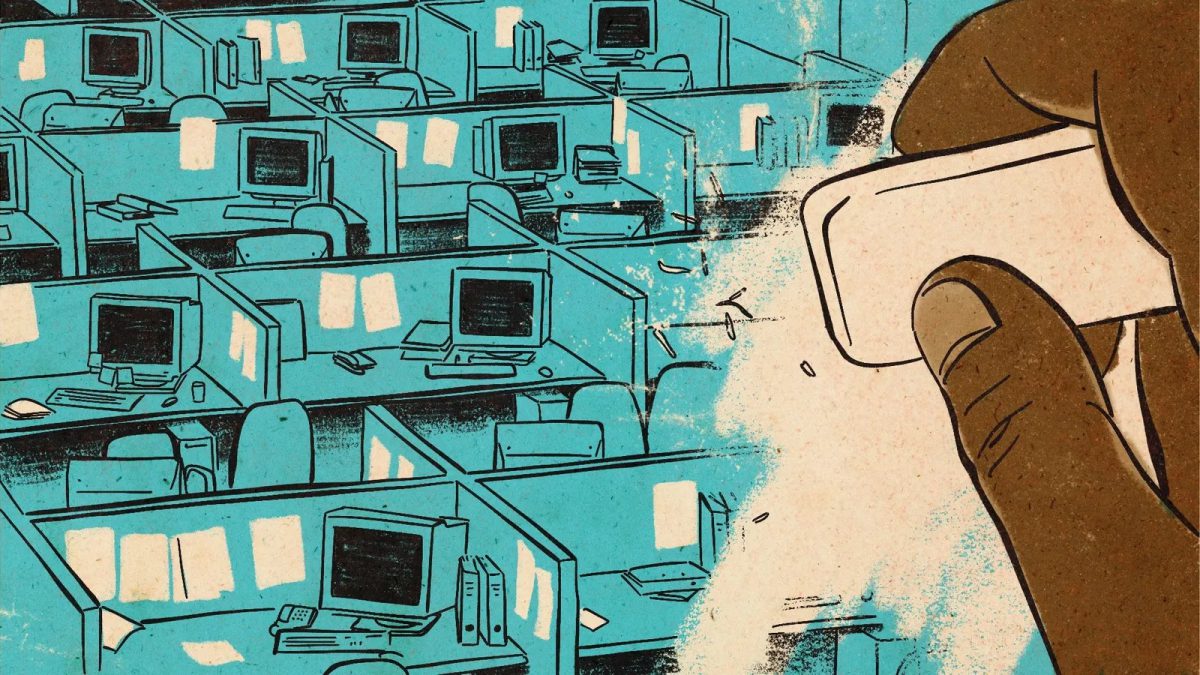Workplace studies in 2019 have reached a common conclusion — remote work is here to stay. Once people try working remotely, up to 99% want to continue, while 95% would recommend the practice to others.
But that’s not all.
A Zapier survey revealed that 74% of workers would quit their jobs for the ability to work from anywhere. Two in three believe that the traditional workplace will be obsolete within the next decade.
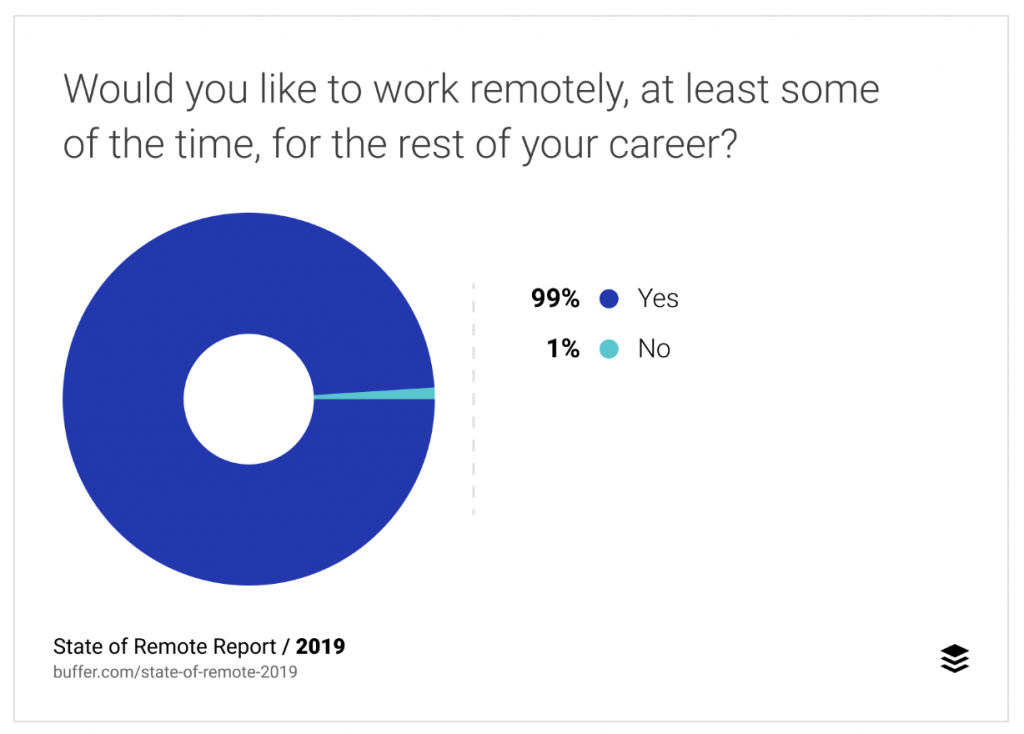
They’re right.
According to the U.S. Census Bureau, the number of people working remotely has been rising for the past ten years. Meanwhile, UpWork projects that the majority of the workforce will be freelancing as soon as 2027. Globally, one billion people could be working in a remote capacity by 2035.
Whether people become remote employees, online entrepreneurs, freelancers, or other gig workers — one thing’s for sure — life will be nothing like the current 9–5. The world will change and reflect this new reality.
A force to reckon with
Once the number of remote workers reaches a critical mass, we will be hugely influential when it comes to topics such as immigration, economic and tax policy, zoning and city planning, geopolitics, and more. We will see sweeping changes in consumer behaviour and disruption across industries.
New products and services catering to the digital workforce will flood the market. People who work remotely will have near-complete autonomy over their daily lives — potentially for the first time.
After more than a decade of working from home or while travelling, here are twelve ways I think life will change when remote work becomes “work”:
1. We will see a brain drain away from cities for the first time in generations

The first cities rose in conjunction with the Industrial Revolution. But the next revolution is digital. As our economy transforms from physical to virtual, it will directly impact where people live and work.
McKinsey found that 30% of the U.S. population lives in twenty-five “megacities,” due to the presence of jobs in tech, media, healthcare, real estate, and finance.
But for how long?
A 2018 Gallup Poll showed that while 80% of Americans live in cities, only 12% want to. In response to rising housing prices and “soul-crushing commutes,” metropolitan areas from New York to San Francisco are now experiencing a net loss in population growth.
People historically moved to cities for job opportunities. When geography is no longer a factor in finding a job, there will be a mass exodus away from urban areas as people search for a lower cost-of-living and higher quality of life.
Enter — Remote Work Programs
To capitalize on the remote work trend and the growing number of people leaving cities, policymakers in Vermont, Nebraska, and Oklahoma have developed programs to help remote workers resettle in their states. They aim to spur economic development by offering potential residents up to $10,000 in cash incentives, housing allowances, and other means of support. You can find out more details in the video below.
Private companies are following suit. In 2017, Zapierbegan offering employees a $10,000 “de-location” incentive to move away from Silicon Valley. Meanwhile, a new startup called MainStreet announced they will be training new remote workers across suburban and rural America and helping them find tech jobs.
In the future, there will be plenty of similar programs and incentives to support workers who choose to leave large cities and tech hubs.
2. Fewer people will commute, and traffic patterns will normalize

Commuting wastes time, costs money, and drains energy. It’s also proven to adversely affect people’s moods, mental health, and productivity. By simply eliminating the daily commute, workers can save thousands of dollars and hundreds of hours per year.
Once people get a taste of what life is like without a commute, they’ll never go back. (Hell, they may never leave their houses.) Thus, when remote work goes mainstream, traffic patterns will even out and fewer people will need to buy cars.
It may be hard to imagine a world without rush hour, but The Washington Post agrees, asserting that the fastest-growing commute is not having one.
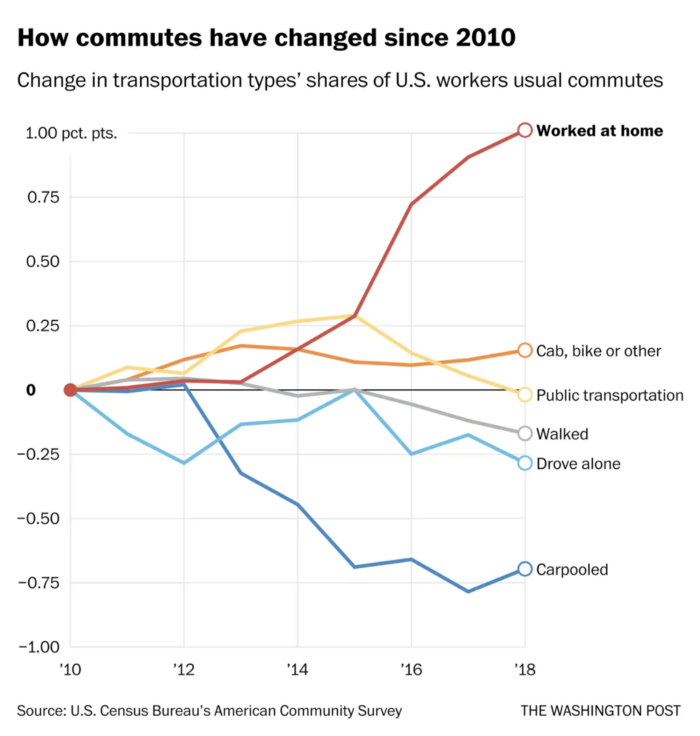
Without commuting, society will revert to a time when we rarely strayed more than a few miles from our places of residence, which leads me to my next point:
3. Housing markets will crash and shift

Question: If you didn’t have to live near your job, where would you live?
Answer: Anywhere you want.
Homeownership in America is already in a state of decline. But the unpredictability of work in the gig economy and the desire for flexibility in work and life will boost this trend. When jobs are available everywhere, the demand for real estate in cities like New York, San Francisco, and Los Angeles will drop — along with prices.
When remote work goes mainstream:
- People will buy fewer houses in urban areas.
- People will purchase more homes in rural areas.
- More people will try alternative housing options, such as co-living and work-travel groups.
People will move to be near family or for a better climate or a lower cost of living. Others will become full-time digital nomads.
In a sign of things to come, Selina, the world’s first hotel chain for digital nomads, plans to have 500 locations by 2022.
4. Demand for office leasing and commercial real estate will plummet

The offices of the future are in the cloud and on the road. While tech companies were the first to embrace remote teams and operate without a physical office, other industries will follow.
Fully-distributed companies have an advantage over their location-dependent counterparts because they’re more profitable and flexible. They save money on overhead and managerial expenses while being able to attract the best talent in the world.
Brick-and-mortar companies will find it hard to compete with remote competitors who can create, innovate, and iterate faster and cheaper. For example, it’s easier for online fashion brands to produce and dropship new lines than it is for Zara to stock retail shelves.
As a result,
- Companies across industries will hire remote workers.
- Knowledge workers will be the first to leave traditional offices.
- A company’s growth will no longer be correlated with an increased need for office space.
Flexible versus fixed workspaces
While the demand for fixed offices lags, it will increase for flexible workspaces.
In Canada alone, the amount of flexible workspace has increased by more than 300% in recent years. CBRE vice-chairman Paul Morassutti noted that,
“We haven’t seen a new type of office tenant emerge with such speed and dominance since the dot-com boom.”
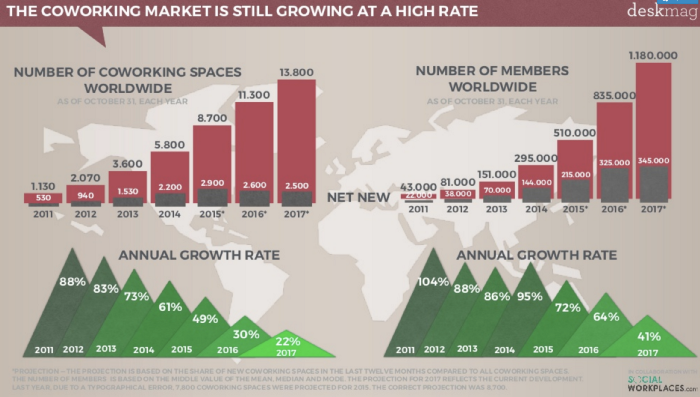
With all of WeWork’s flaws, attention is shifting to more flexible co-working membership models like Coworker’s Global Pass, which provides access to 3,000 co-working spaces in over 105 countries for $50/month.
Wondering what will happen to all the unused commercial spaces such as defunct malls, big box stores, and empty offices? Many will be converted into co-working and co-living spaces.
5. Millions of jobs will disappear while new ones are created

The threat of A.I. and automation will force more people to either combine their skills in unique ways, start working autonomously, or otherwise change career paths.
According to a recent McKinsey survey on the future of work in America,
“The day-to-day nature of work could change for nearly everyone.
The coming wave of automation will affect some of the largest occupational categories in the US economy.”
Nearly 40% of U.S. jobs could be affected. But at the same time, millions of new ones will be created — mainly on a digital plane.
“Workers will have to become more comfortable and fluent with advanced technologies becoming a part of their everyday roles.” — Sam Hassani, Future of the Workplace
Online freelancing will be one solution in a post-AI world, out of either opportunity or necessity.
Freelancing income reached $1 trillion this year, with the percentage of full-time freelancers growing from 17% to 28% between 2014 and 2019.
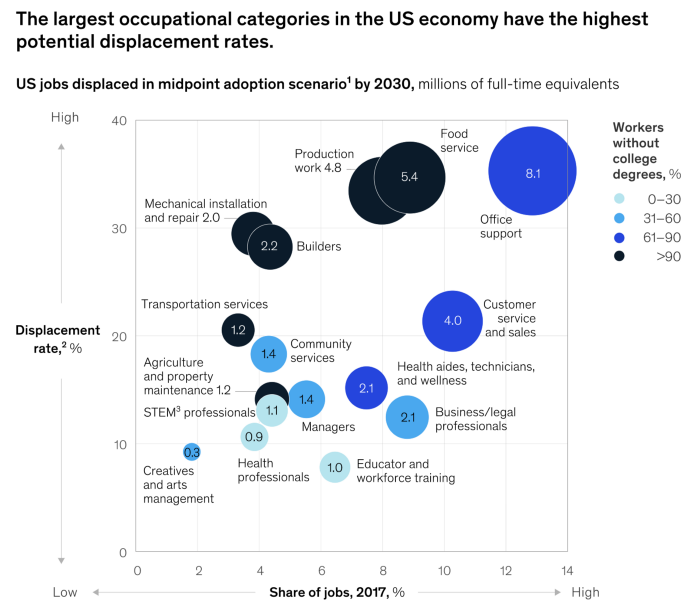
6. The balance of power will shift from employer to employee

Workers value flexibility more than any other workplace perk — including higher pay or more vacation days. If companies don’t offer what workers want, they will go elsewhere. Or, they’ll start working for themselves.
As one web developer describes it,
“I don’t look at [remote work] as a perk; I look at it as a requirement.”
In other words — more than a job perk — the ability to work remotely will become a workplace right or labour issue.
What are the implications of this shift?
- Governments will offer more individual remote work incentives, in addition to corporate tax incentives. Instead of depending on companies like Amazon to create jobs, they will invest resources in making it easier for remote workers to relocate.
- Companies will dole out more hiring bonuses to attract remote workers.
- Companies will offer more financial incentives to help employees de-locate and transition to working remotely.
- More national governments will follow in Estonia’s footsteps by creating E-Residency and “Digital Nomad Visa” programs.
Overall, governments will find new ways to bolster their economies, while remote workers gain more authority and influence as a special interest group.
7. Consumptions patterns will shift from material goods to experiences

Data indicates that spending money on experiences is more fulfilling than buying material things. The shift to remote work supports this notion while amplifying the trend toward minimalism. This is good news for consumers looking to save for retirement but bad news for businesses that rely on cyclical consumption.
Remote workers spend our money differently compared to people who commute to an office. For example, we spend less on mortgage, rent, utilities, business attire, car payments, gas, entertainment, and shopping. However, we typically spend more on insurance, travel, co-working memberships, online courses, business expenses, and monthly subscriptions.
Likewise, when what you wear or drive to work is no longer a thing, people will spend less on luxury goods and find new ways to signal their social status and identity.
8. The global middle class should grow

Massive wealth concentration seems like an irreversible problem. However, remote work has the potential to bring millions of people out of poverty and increase per capita income worldwide — especially in rural areas and developing countries.
We live during a time where dropshipping solopreneurs can compete with the likes of Target and Walmart. When traditional retailers like Forever21 and Toys “R” Us close up shop, individual online sellers absorb a bigger piece of the economic pie.
Remote work also levels the playing field when it comes to age, race, disability, or geographic location. For example:
- Single moms in Guatemala can sell jewellery on Etsy.
- Virtual Assistants in the Philippines can make a livable wage without commuting to Manila.
- Entrepreneurs in India can access the European market without leaving home.
- Citizens of low-wage countries throughout Latin America, Russia, Eastern Europe, and beyond can increase their income potential through remote work.
- Economic immigrants and expatriates also have the option to return to their home countries without sacrificing their paychecks.
More than a side hustle, the ability to work remotely should increase opportunities and earning power for everyone long-term.
9. Traditional universities will lose value

U.S. higher education institutions have enjoyed a brief but profitable run at siphoning money from the country’s youth. But such days are numbered.
Depending on your career path, it hardly makes sense to go to college in the U.S. anymore. University curriculums and professors can’t keep up with the rate of new information and the pace of technological change in many fields of study.
There will always be a place for higher education, but not in its current form. There’s no reason to amass massive amounts of student loan debt if you’re never going to use your degree.
The gig economy is results-oriented. You don’t need college classes to learn graphic design skills or how to run Facebook ads.
Over time, if the U.S. government doesn’t make college free for everyone, more people will design their own real-world diplomas.
10. The global financial landscape will change

Since Bitcoin emerged in 2009, it’s taken years for the Fintech industry to catch up. Today, however, consumers can choose from more than 3,000 cryptocurrencies and hundreds of online banks.
Companies like Revolut, N26, and TransferWise make it fast, affordable, and easy to send money anywhere in the world.
Gone are the days of rolling up to a bank in a foreign country with a stack of paperwork to open an account, only to wait weeks for approval. Today, you can choose from a selection of low-cost, cross-border banking options and open multiple foreign currency accounts in minutes. Plus, crowdfunding makes it easier than ever to raise capital rather than applying for a bank loan.
As the number of people working online increases, so will the demand for global, agile, banking solutions with low fees and transfer times.
Global markets will also change. Industries such as technology, travel, and services should increase in value and market cap compared to traditional manufacturing and brick-and-mortar retail.
11. We will have a global citizenship/taxation system
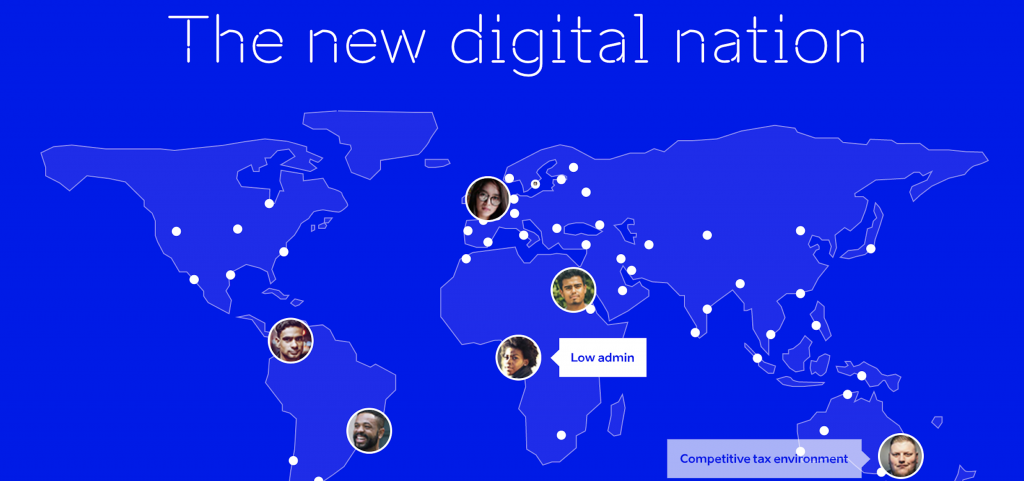
Many remote workers and digital nomads currently live in a “grey area” where they live and work abroad without work permits or long-term visas. This is because few countries have official categories that fit the needs of today’s digital workforce.
A growing number of remote workers don’t pay any taxes, either. Some digital nomads operate almost as stateless citizens, working in the cloud and never staying a destination long enough to be considered a tax resident. But when enough people slip through the proverbial cracks, tax authorities around the world will react.
The technology already exists to track international remote workers. One hundred fifty countries currently emit e-passports for over 1 billion people, with more advanced virtual passports expected soon.
But this isn’t just a predicament for individual workers — remote employers must also comply with local and international laws and regulations. This ambiguity needs to change for clarity, consistency and ensuring the flow of business. And it will.
Eventually, there will be international citizenship, work permit, passport, and taxation system for the millions (or billions) of nomadic “citizens of the world.” Unofficially, companies like Remote Year already count thousands of alumni, or “citizens,” in their “Remote Nations.” But soon, there will be international remote labour laws and standards for companies, freelancers, and entrepreneurs to organize around.
Having consistent, transparent, and fair international regulations around remote work is a good thing. It provides certainty for online businesses and reflects society’s increasing sense of shared humanity, identity, and collective global consciousness.
12. Birth and marriage rates in the developed world will continue to decline

Marriage and birth rates in parts of the U.S., Asia, and Europe have been in decline. Remote work likely won’t reverse this trend.
One of the biggest drawbacks of working from home is the propensity for isolation, loneliness, and mental health issues. It’s too soon to tell what the implications of remote work will be on dating and family planning, but suffice to say that it will be a challenge to overcome. Thus, remote workers need to be proactive about self-care, networking, socializing, and forming relationships. I’ve been a digital nomad for more than ten years, and I still struggle with this aspect of the lifestyle.
Conclusion: How to prepare for these changes

We may be a few years (or decades) away from these predictions coming true, but the decentralization of the modern workforce is happening now.
When we reach a tipping point for remote work, things will change seemingly overnight, though this shift has been more than fifty years-in-the-making.
To help prepare yourself for the remote revolution, here’s what to do:
Individuals:
- Accept your power. We are at an unprecedented time in history. Stop accepting the status quo if it’s not working for you. Think creatively and make a plan to achieve what you want in life.
- Improve your skills. Focus on continuous learning and self-development to remain competitive in the new economy and fight the threat of automation.
- Set your terms. Ask your employer for flexible work, or find alternative options. Just remember we are at the beginning of the remote work wave, and it’s not entirely mainstream yet.
Companies:
- Embrace the reality that remote work is the new normal. Change is hard, but it’s inevitable.
2. Become an early adopter. Start integrating remote work policies now — before they’re mandated. This practice will reduce your operating costs and give your company an edge over competitors while boosting employee morale and recruitment efforts.
3. Plan for the future. Integrate remote-first thinking into your long-term strategic planning.
The ability to work remotely is the result of technological advances, the arc of human history, and the changing social fabric of our world. Who we are is no longer about what we do or where we live.
The predictions I put forth in this article are not meant to claim correlation or causation, but rather to suggest what can happen as work and life become more intertwined. Ultimately, individual empowerment and collective change will dictate what’s possible in the future of work. The opportunities are endless.
Originally published at Medium and written by Kristin Wilson
https://medium.com/swlh/12-ways-the-world-will-change-when-everyone-works-remotely-cb8927ef1853
